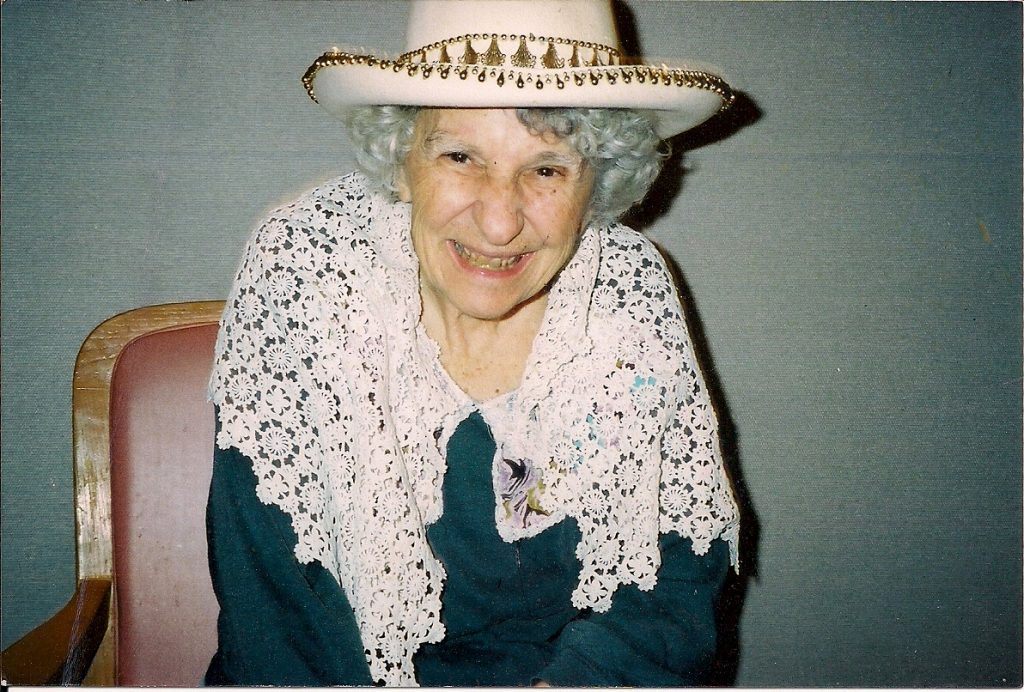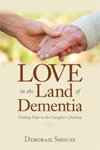Posts Tagged ‘Mother’s Day’
Celebrating our Mothers
If my mother were still alive, I would be taking her roses and chocolate this Mother’s Day. She would be delighted and her delight would magnify when my daughters and her great-grandchildren arrived. Love is such a beautiful glue, such a simple and strong way to stay connected. I wanted to share this story from Love in the Land of Dementia, as a way of celebrating our mothers.
The Woman She Was
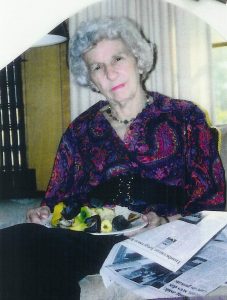 My friend Karen gives me a gift: she says, “Tell me about your mother.”
My friend Karen gives me a gift: she says, “Tell me about your mother.”
We are sitting in a quiet mid-afternoon café and I let the question sink into me.
When friends occasionally ask me, “How is your mother doing?” I have different answers, depending on the situation. If we are in one of those conversations that are like confetti in brisk wind, I say, “She’s okay.”
If we are sitting across from each other and my friend is looking right at me, I answer, “She’s pretty deep into Alzheimer’s.”
“Does she recognize you?” she might ask.
“No, but she may recognize I am a person she likes,” I answer.
That usually ends that conversation.
But “Tell me about your mother,” is an invitation I don’t usually get.
“What would you like to know?” I ask.
She stirs her iced mocha. “Whatever you want to tell me,” she says softly. “I would like to know about her life and her interests.”
Since my mother has been in the nursing home with Alzheimer’s, I have seldom talked about the person she used to be. Occasionally my father and I reminisce about family vacations and outings. I sometimes ask Dad questions about our growing up days and the early days of their courtship. But I rarely think about the woman I knew all my life, the mother, grandmother, artist, gardener, compassionate friend, avid reader, bird-watcher, early morning walker, lemon-meringue pie baker. That woman is gone and I have spent a lot of energy learning to know and appreciate the woman who now commandeers her body.
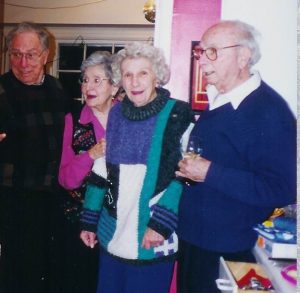 As I consider what I want to tell Karen, I remember visiting my mom’s best friend, Bel, in California when I was a teenager. Bel, who was spunky and adventurous in a way that seemed so different from my conservative mother, drove me from Berkeley to the small resort where I would work as a chambermaid for the summer.
As I consider what I want to tell Karen, I remember visiting my mom’s best friend, Bel, in California when I was a teenager. Bel, who was spunky and adventurous in a way that seemed so different from my conservative mother, drove me from Berkeley to the small resort where I would work as a chambermaid for the summer.
“Do you know how I met your mom?” she asked me, as we drove down the winding roads, past fragrant stands of eucalyptus trees.
“In Iceland, during the World War II,” I said. I had heard stories of the two of them taking a break from their work in the hospital by skiing, then stopping for a soak in a hot springs.
“No, we met earlier in Chicago. We were both nurses working the twelve-hour night shift. The hospital had a room with a couple of bunk beds so we could rest on breaks. One night I walked in there and heard the most heart-breaking sobbing. It was Frances, crying her eyes out. I asked her what was wrong and she said, ‘Nothing.’”
I smiled. That sounded like Mom, never wanting to admit anything was wrong.
“Then I asked her again and she sobbed out that her husband Sam had died six months ago from pneumonia. She was so sad she didn’t know if she could go on. A bunch of other nurses and I were going to Florida for a short vacation and I persuaded your mother to join us. But as it turned out, we never went; a week later I decided to join the Army and I encouraged her to come along. We’ve been best friends ever since.”
When I heard this story at the age of seventeen, I was too young to fathom my mother’s grief and despair. By the time I told Karen the story, I had some sense of what my mother must have gone through.
“Your Mom was really brave, to serve in the Army during wartime,” Karen says.
I feel a little swell of pride. Mom’s tales of traveling in the darkest night on the troop ship, with bombs falling nearby, were so familiar I had never considered her bravery and courage.
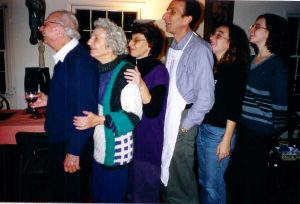 Now I tell Karen how my father, encouraged by Bel’s husband, wrote Mom a letter, telling her he was ready to marry a nice Jewish girl. Was she interested? Was she available?
Now I tell Karen how my father, encouraged by Bel’s husband, wrote Mom a letter, telling her he was ready to marry a nice Jewish girl. Was she interested? Was she available?
After some correspondence, Mom surprised herself by agreeing to meet him in Chicago. At the end of the week, my father asked her to marry him. She considered the offer for three weeks and accepted. Their whirlwind romance was fueled by practicality.
“What a great story,” Karen says. “Your mother must be an amazing woman.”
Sparked by Karen’s interest, I let myself feel my love for my mother as she used to be. I am in tears by the time our conversation ends.
“Thank you for asking me about my mother,” I say to Karen.
“Your stories make me want to call my own mom and hear her stories again.”
As I drive home, I think of more “mom” stories to share with my children and my brother. I see myself, along with my brother and father, as the carrier of my mother’s sacred legacy. I imagine myself tenderly fanning the embers, adding dry leaves and crumbled paper, creating a blaze with each memory. I realize I don’t have to give up Mom’s old self: I can be her historian and her scribe, carrying her stories with me, and making sure they live on.
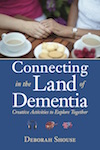
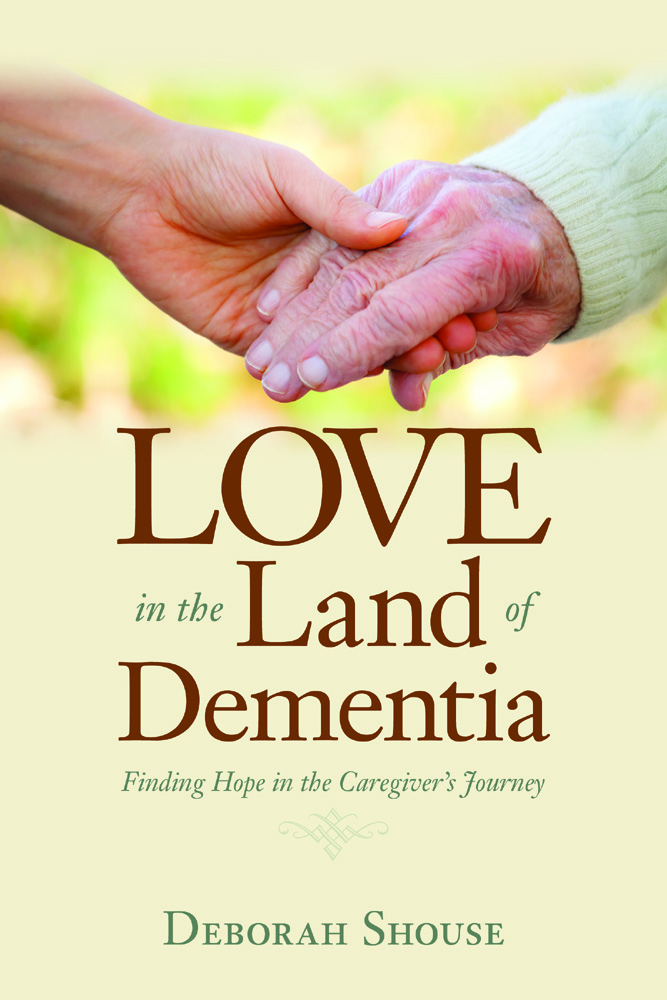
Four Fine Ways to Keep Remembrances Blooming
How do you celebrate Mother’s Day or Father’s Day when your parents are no longer living? As the day approaches, I think of my parents and look for ways to keep remembrances blooming. During the years, I’ve explored ways to feel close with my mother, father, and other loved ones who have passed on. Here are four of the actions that keep me connected.
Dress to Connect
When I feel lonely for Mom, I like to put on her black blouse emblazoned with silver sequins. When Mom wore this blouse, it signified she was going someplace elegant. She accompanied it with a long black skirt and high heels. When I put on my ordinary black slacks and black tennis shoes, I imagine my mother shaking her head. “Don’t you have any better shoes, dear?” My mother prods me from beyond the grave, intoning, “A little lipstick would be nice.” Here’s the lovely part of our post-death ritual: instead of bristling at her grooming suggestions, I see how she wished the best for me and fondly remember her love of dressing up.
Feed your Memories
I still love to eat and share my parents’ favorite foods. My brother, who has untold culinary abilities, has mastered Mom’s butterscotch brownies and he has improved on her chocolate chip cookie recipe. He often bakes those for family gatherings and sometimes even mails me a box of nostalgic homemade treats. As for my dad, he particularly liked Planter’s Deluxe Nut Mix. He adored the cashews, but he didn’t want to spend the money to upgrade to all cashews. He preferred to pick out the deliciously rare morsels, leaving behind a plethora of peanuts, almonds, and hazelnuts. In his honor, I often buy a can of mixed nuts. Did you know that memorial cashews have no calories?
Tell their Stories
We all have heirloom family stories that anchor us in our history. My father liked to talk about his growing up days in the Canal Zone, in Colon, Panama. My mother favored her time serving as an Army nurse in Iceland during World War II. These were the stories of my growing up years and I think of them every time someone talks about Iceland, Panama, the Canal, or WWII. I have written some of them down so I won’t forget them. When I tell one of my parents’ stories, I feel they are in the room, leaning forward, smiling, and listening with delight. I like to share these tales at family gatherings and I like to tell them to friends. I also like to invite other people’s legendary stories.
Continue the Conversation
Sometimes I go on a solitary walk and talk to my mother. She loved birds and I point out the robins, cardinals, and sparrows on the route. I also tell her about my grandchildren, my work, and I discuss any dilemmas I’m struggling with. My father loved being in the water and I often commune with Dad when I’m swimming backstroke. I tell him entertaining things that are going on and talk to him about my dreams and big ideas. My parents are still good listeners and I picture them nodding proudly and cheering me on.
A version of this article originally appeared on MariaShriver.com
Deborah Shouse is the author of Connecting in the Land of Dementia: Creative Activities to Explore Together and Love in the Land of Dementia: Finding Hope in the Caregiver’s Journey.
Three Tips for Celebrating Mother’s Day When your Mom Has Dementia
“I don’t know what to do about Mother’s Day,” a friend recently told me. “I used to celebrate with my mother, but Mom doesn’t really recognize me now and the holiday won’t mean anything to her.”
My friend was not alone in her dilemma: according to the Shriver Report, ten million women either have Alzheimer’s or are caring for someone with it.
I’d faced the same issue with my mom as she sank into Alzheimer’s. But I’d decided that celebrating Mother’s Day was important for me and for my family, even if Mom didn’t truly understand what was going on.
Here are three tips I devised for reducing the sadness this holiday can trigger and for substituting a celebration of renewal and connection.
Feel Your Frustration and Grief
The happy-family-candy-and-flowers Mother’s Day television commercials seemed to shout at me: “Your mother is no longer who she used to be!” That was true and a spike of sorrow stabbed at me as I mourned my “normal mom.”
Celebration: Talk about your feelings with empathetic friends; feel your grief and the frustration. Explore ways to express yourself, perhaps through journaling, collaging, stomping about. Or cocoon and immerse yourself in mournful movies and music.
Activate Your Appreciations
My mother could not complete a sensible sentence, cook a simple meal or dress herself. She did not know my name or remember any of my accomplishments or stellar qualities.
Celebration: Notice and appreciate the good in your situation. Even though Mom didn’t remember my name, she also didn’t remember any of my shortcomings. She was no longer critical of my parenting skills and no longer shy to show affection. She had a dazzling smile, a whimsical giggle and an ability to look into my eyes. She was content with who I was, whoever I was. These were qualities to celebrate.
Celebrate Yourself and Your New Relationship
Since my mom could not care for herself, I learned to care for her. Our lives wove together and we became deeply connected, as I emerged from being just a daughter to becoming an advocate, spokeswoman and historian for my mother.
Celebration: On Mother’s Day, I stopped to celebrate myself, my flexibility, my sense of humor, my steadfast feelings of responsibility. I gave myself the gift of time and appreciation.
7 Ways to Concoct a Creative Celebration
Share favorite memories
Tell her favorite life stories
List her opinions, maxims and worries
Sing along to favorite family music
Muse over family photos
Serve up easy comfort foods
Share what you’ve learned from your journey with her
Deborah Shouse is the author of Love in the Land of Dementia: Finding Hope in the Caregiver’s Journey. COMING SOON: CONNECTING IN THE LAND OF DEMENTIA: CREATIVE ACTIVITIES TO EXPLORE TOGETHER
Celebrating My Mother
Here is a story celebrating mothers from my book, Love in the Land of Dementia.
My friend Karen gives me a gift: she says, “Tell me about your mother.”
We are sitting in a quiet mid-afternoon café and I let the question sink into me.
When friends occasionally ask me, “How is your mother doing?” I have different answers, depending on the situation. If we are in one of those conversations that are like confetti in brisk wind, I say, “She’s okay.”
If we are sitting across from each other and my friend is looking right at me, I answer, “She’s pretty deep into Alzheimer’s.”
“Does she recognize you?” she might ask.
“No, but she may recognize I am a person she likes,” I answer.
That usually ends that conversation.
But “Tell me about your mother,” is an invitation I don’t usually get.
“What would you like to know?” I ask.
She stirs her iced mocha. “Whatever you want to tell me,” she says softly. “I would like to know about her life and her interests.”
Since my mother has been in the nursing home with Alzheimer’s, I have seldom talked about the person she used to be. Occasionally my father and I reminisce about family vacations and outings. I sometimes ask Dad questions about our growing up days and the early days of their courtship. But I rarely think about the woman I knew all my life, the mother, grandmother, artist, gardener, compassionate friend, avid reader, bird-watcher, early morning walker, lemon-meringue pie baker. That woman is gone and I have spent a lot of energy learning to know and appreciate the woman who now commandeers her body.
As I consider what I want to tell Karen, I remember visiting my mom’s best friend, Bel, in California when I was a teenager. Bel, who was spunky and adventurous in a way that seemed so different from my conservative mother, drove me from Berkeley to the small resort where I would work as a chambermaid for the summer.
“Do you know how I met your mom?” she asked me, as we drove down the winding roads, past fragrant stands of eucalyptus trees.
“In Iceland, during the World War II,” I said. I had heard stories of the two of them taking a break from their work in the hospital by skiing, then stopping for a soak in a hot springs.
“No, we met earlier in Chicago. We were both nurses working the 12-hour night shift. The hospital had a room with a couple of bunk beds so we could rest on breaks. One night I walked in there and heard the most heart-breaking sobbing. It was Frances, crying her eyes out. I asked her what was wrong and she said, ‘Nothing.’”
I smiled. That sounded like Mom, never wanting to admit anything was wrong.
“Then I asked her again and she sobbed out that her husband Sam had died six months ago from pneumonia. She was so sad she didn’t know if she could go on. A bunch of other nurses and I were going to Florida for a short vacation and I persuaded your mother to join us. But as it turned out, we never went; a week later I decided to join the Army and I encouraged her to come along. We’ve been best friends ever since.”
When I heard this story at the age of 17, I was too young to fathom my mother’s grief and despair. By the time I told Karen the story, I had some sense of what my mother must have gone through.
“Your Mom was really brave, to serve in the Army during wartime,” Karen says.
I feel a little swell of pride. Mom’s tales of traveling in the darkest night on the troop ship, with bombs falling nearby, were so familiar I had never considered her bravery and courage.
Now I tell Karen how my father, encouraged by Bel’s husband, wrote Mom a letter, telling her he was ready to marry a nice Jewish girl. Was she interested? Was she available?
After some correspondence, Mom surprised herself by agreeing to meet him in Chicago. At the end of the week, my father asked her to marry him. She considered the offer for three weeks and accepted. Their whirlwind romance was fueled by practicality.
“What a great story,” Karen says. “Your mother must be an amazing woman.”
Sparked by Karen’s interest, I let myself feel my love for my mother as she used to be. I am in tears by the time our conversation ends.
“Thank you for asking me about my mother,” I say to Karen.
“Your stories make me want to call my own mom and hear her stories again.”
As I drive home, I think of more “mom” stories to share with my children and my brother. I see myself, along with my brother and father, as the carrier of my mother’s sacred legacy. I imagine myself tenderly fanning the embers, adding dry leaves and crumbled paper, creating a blaze with each memory. I realize I don’t have to give up Mom’s old self: I can be her historian and her scribe, carrying her stories with me, and making sure they live on.
Deborah Shouse is the author of Love in the Land of Dementia: Finding Hope in the Caregiver’s Journey.
Top Three Ways to Celebrate Mother’s Day When your Mom Has Alzheimer’s
“I don’t know what to do about Mother’s Day,” a friend recently told me. “I used to celebrate with my mother, but Mom doesn’t really recognize me now and the holiday won’t mean anything to her.”
My friend was not alone in her dilemma: according to the Shriver Report, ten million women either have Alzheimer’s or are caring for someone with it.
I’d faced the same issue with my mom as she sank into Alzheimer’s. But I’d decided that celebrating Mother’s Day was important for me and for my family, even if Mom didn’t truly understand what was going on.
Here are three tips I devised for reducing the sadness this holiday can trigger and for substituting a celebration of renewal and connection.
Feel Your Frustration and Grief
The happy-family-candy-and-flowers Mother’s Day television commercials seemed to shout at me: “Your mother is no longer who she used to be!” That was true and a spike of sorrow stabbed at me as I mourned my “normal mom.”
Celebration: Talk about your feelings with empathetic friends; feel your grief and the frustration. Explore ways to express yourself, perhaps through journaling, collaging, stomping about. Or cocoon and immerse yourself in mournful movies and music.
Activate Your Appreciations
My mother could not complete a sensible sentence, cook a simple meal or dress herself. She did not know my name or remember any of my accomplishments or stellar qualities.
Celebration: Notice and appreciate the good in your situation. Even though Mom didn’t remember my name, she also didn’t remember any of my shortcomings. She was no longer critical of my parenting skills and no longer shy to show affection. She had a dazzling smile, a whimsical giggle and an ability to look into my eyes. She was content with who I was, whoever I was. These were qualities to celebrate.
Celebrate Yourself and Your New Relationship
Since my mom could not care for herself, I learned to care for her. Our lives wove together and we became deeply connected, as I emerged from being just a daughter to becoming an advocate, spokeswoman and historian for my mother.
Celebration: On Mother’s Day, I stopped to celebrate myself, my flexibility, my sense of humor, my steadfast feelings of responsibility. I gave myself the gift of time and appreciation.
7 Ways to Concoct a Creative Celebration
Share favorite memories
Tell her favorite life stories
List her opinions, maxims and worries
Sing along to favorite family music
Muse over family photos
Serve up easy comfort foods
Share what you’ve learned from your journey with her
Deborah Shouse is the author of Love in the Land of Dementia: Finding Hope in the Caregiver’s Journey.
